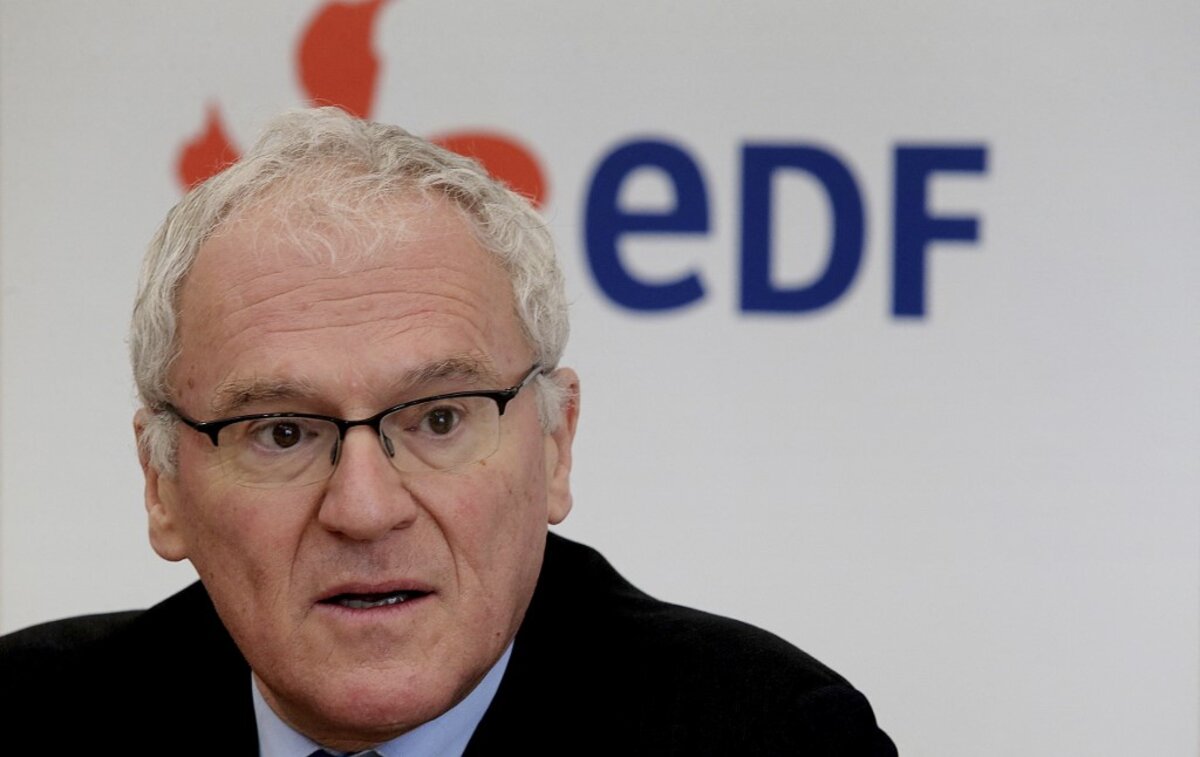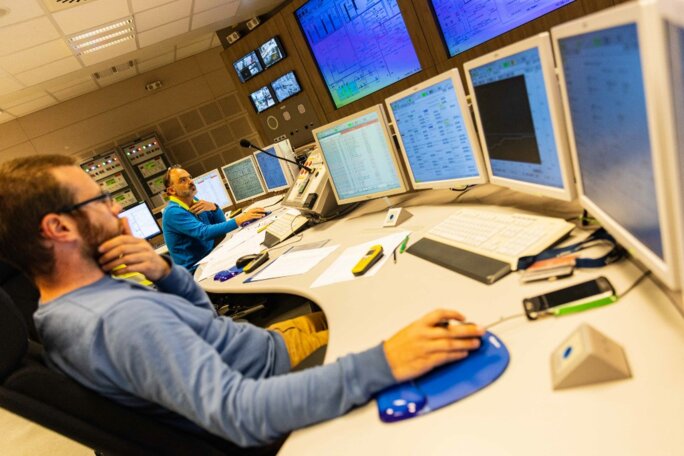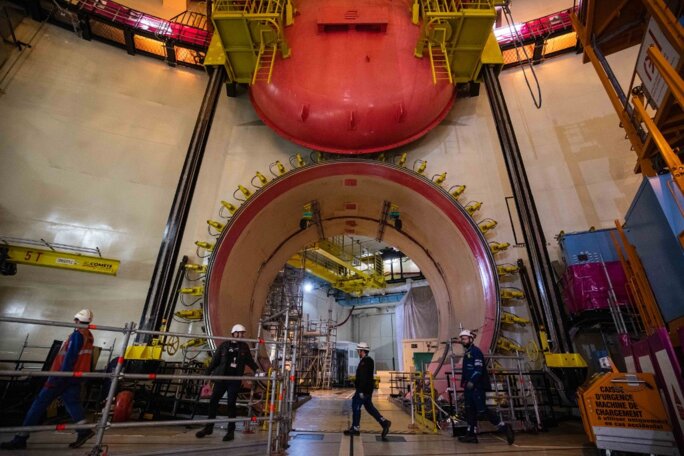Debt-laden French utility giant EDF last month presented its results for the first six months of this year, revealing losses of 5.3 billion euros, set against a year-on-year rise in turnover of just more than 67%, at 66.2 billion euros.
Despite the numerous alerts about its financial situation circulating over the weeks preceding the July 28th announcement, the size of the losses were nevertheless stunning. In its 76 years of existence, the company has never known such a perilous situation.
EDF’s chairman and CEO Jean-Bernard Lévy, 67, announced his resignation earlier in July, after almost eight years in the post, stepping down amid an atmosphere of catastrophe. His successor is due to be announced between now and the end of September.
“The first-half results illustrate the difficulties encountered in nuclear production in France, and to a lesser degree in hydroelectrics, as well as the tariffs shield introduced in France for 2022,” said Lévy in the July 28th statement issued by EDF, referring to a government-ordered “shield”, or block, on gas and electricity price rises.
Since the start of this year, EDF has faced unprecedented industrial problems. In France, where it operates the largest fleet of nuclear reactors in Europe, 12 out of a total of 56 reactors have had to be closed down in response to corrosion problems identified by the country’s nuclear safety watchdog, the ASN; a further 18 reactors have halted activity for maintenance work due to ageing of the plants, and which was delayed during the height of the Covid-19 crisis. Furthermore, the drought conditions that have worsened in France over recent months have caused difficulties for the production capacity of its hydropower activities.
While the effect overall has been a 25% fall in its electricity output in France, EDF announced its “nuclear production forecast for the year is in the range of 280 to 300 TWh [Terrawatt-hour]”, a forecast which it said was reinforced by the ASN’s validation last week of its strategy for dealing with the reactor corrosion problems.
The situation was made all the more acute by the government’s decision to impose, at the beginning of the year, a cap on electricity and gas price rises, a move aimed at protecting households from soaring energy costs. As of the introduction of this so-called “tariffs shield”, EDF’s management complained of the vast cost this represented for the company, and warned that it would result in gigantic financial losses.
In January, the French government ordered the company to increase the amount of electricity it sells to smaller, private competitors from 100 TWh to 120 TWh, at a price of 42 euros per MWh (megawatt-hour) – which could rise to 46.2 euros – well below market prices which have reached as much as 250 euros per MWh. To counter its fall in electricity production, EDF has had to buy the missing TWh on the market, selling them back to the competitors at a loss.
Meanwhile, no measure of control has been put into place to ascertain how those competitors are using the electricity and whether households are benefitting from the move.
This situation of selling at a loss, and which is opposed by all the company’s staff unions, is likely to continue until the end of the year after the government announced it will maintain the “tariffs shield” until December 31st.
It was amid this significant deterioration in EDF’s financial situation that French Prime Minister Élisabeth Borne announced in early July that the state, which currently holds an 83.76% stake in the company, will buy up the shares of all minority shareholders to fully re-nationalise the utility. The move, with a provision of 10 billion euros for the shares buy-back, was approved later in the month by parliament, along with other revisions to the 2022 budget.
However, the government has not made its plans for the future of EDF public, nor how it intends to rectify the company's financial woes.
On July 8th, two days after the government formally announced its re-nationalisation of EDF, Mediapart published on its French-language pages a detailed report of the company’s financial difficulties, which is republished in English below.
*
It is the scenario of an impending disaster that just a few years ago would have been regarded by many as impossible. EDF is on the verge of a financial collapse, and the situation is so concerning by mid-June that the company’s works council used its right to issue a formal alert of impending danger, when it warned that “EDF will not survive the year”.
In july, French Prime Minister Élisabeth Borne announced her government was to re-nationalise EDF, after which the company’s chairman and CEO Jean-Bernard Lévy immediately announced he was taking early retirement. But before Borne's announcement, credit rating agency S&P was preparing to lower the utility giant’s rating. “That was no doubt one of the factors that led the government to speed up on the case,” commented a financier, whose name is withheld on request. “A new downgrading would have complicated the group’s funding and compromised the president’s nuclear projects.”
Mediapart has been informed that EDF is expecting to issue a negative “earnings before interest, taxes, depreciation, and amortization” (EBITDA) statement at the end of the year. According to some sources, the losses may be in the order of between 10 and 15 billion euros, while EDF’s debt at end of this year may reach as much as 70 billion euros, compared to 48 billion euros at the end of 2021.

Enlargement : Illustration 1

These remain provisional estimates; the energy crisis that has affected Europe since the summer of 2021, and which has been significantly worsened by the war in Ukraine, has led to a leap in electricity prices. If the current threat of a serious shortfall in supplies of gas, which serves as a reference point for the price of electricity on the European wholesale market, became a reality, then prices would go through the roof. In that situation, EDF would be severely affected.
Everything that’s happening was foreseeable, written in advance,” commented a source with close knowledge of EDF’s difficulties. “For more than ten years, we have been seeing a series of decisions by interested parties and governments which have ransacked EDF. With the energy crisis, and the war in Ukraine, we are today discovering the extent of the dogma of the European Commission, of the belief in markets. We have neither an energy strategy nor energy security. And EDF, which was the European champion, is on its back. What a result.”
A series of exceptional factors has led to the derailing of EDF. But some of them could have been avoided if the government had taken different decisions, and notably regarding the conditions of its measure to cap energy price rises, a so-called “tariffs shield”, aimed at easing the cost of living crisis.
In a cynical move in early January, four months before France’s presidential elections, the government called upon EDF to take on the cost of its cap on energy prices, placing a ceiling of 4% on the rise in the cost of electricity as of February. Under the terms of the “tariffs shield”, EDF was ordered to increase the amount of electricity it sells to smaller private competitors from 100 TWh (Terrawatt-hour) to 120 TWh, at a price of 42 euros per MWh (megawatt-hour). Because EDF does not have sufficient electricity available in-house to meet that extra supply, it was forced to buy in electricity at market prices that reach up to 250 euros per MWh, and sell this back to its domestic competitors at a loss.
When the government measure was announced on January 13th, EDF estimated it would cost the company 8 billion euros. But since then, the cost has been re-evaluated at 10.2 billion euros, and it will certainly rise even further following the government’s pledge to prolong its “tariffs shield” until at least the end of the year.
“All of that could have been avoided if the government had taken other decisions,” said Sébastien Menesplier, general secretary of the energy workers’ branch of the CGT trades union (FNME-CGT). “If it had decided, as Spain did, to take leave of the European energy market, if it had lowered VAT on energy to bring it to 5.5%, if it had re-worked electricity prices, that would have been much more effective for maintaining purchasing power. Instead of that, it preferred that EDF continues to enrich its competitors.”
The criticism is all the more justified given that the price capping measure was conceived using contested methodology. France’s Energy Regulatory Commission, the CRE, which oversees both the electricity and gas markets, in January established that regulated electricity prices were bound to rise by 44%, causing the government to panic and to put the energy “tariffs shield” in place for electricity. “If the CRE had decided to change the period of reference, to even out the prices over a longer period, the rise in electricity prices would have been 10 percent at the most,” commented an expert in the electricity market in France, whose name is withheld. “That could have been easily bearable for a large section of households. But the CRE preferred to present the worst case, to the detriment of EDF and public finances, and to enrich traders.”
That comment was much in line with the conclusions of a recent report on the electricity market by France’s national audit office, the Cour des comptes. It underlined that the method used by the CRE in its calculations “results in prices at a level that largely exceed [market] prices”. The government is manifestly undisturbed by the affair, having made CRE president Jean-François Carenco junior minister for French overseas territories, also in July.
An unprecedented 'industrial accident'
If the cost of the energy price cap is so heavy for EDF, it is also because it has been faced with an unprecedented industrial accident which the government appears to have taken little, if any, measure of. In France, EDF operates 56 nuclear reactors, the largest national fleet of the kind in Europe. But only around 30 of these are currently operational; 12 out of the 56 were forced to shut down by the country’s nuclear safety watchdog, the ASN, for repairs to corrosion found in piping. Another 18 reactors are undergoing maintenance work, some of which had been postponed during the height of the Covid-19 crisis. Electricity production in 2022 is forecast to fall from a previous 350-380 TWh to around 280-300 TWh, after CEO Jean-Bernard Lévy announced a possible further fall in production in the second half of this year.
The financial consequences of this are significant. Currently, the company expects it will represent losses of 18.5 billion euros on its EBITDA, but that is a provisional estimation given that EDF is now dependent on the European electricity market for part of its supplies.
Even if the shut-down of so many reactors is an exceptional event, it raises questions about the management of the French nuclear fleet. Belgium, which operates reactors comparable to those in France, does not have the same problems. Some, including within government, have suggested this is due to the very demanding standards put in place by the ASN.

Enlargement : Illustration 2

But within EDF, many criticize a managerial culture that has become preoccupied with short-term results, with ever greater dividends demanded by the shareholder state, and embarking on ruinous financial operations. As of the early 2000s, investment was reduced, as were preventive maintenance operations, and the company increasingly turned towards subcontracting.
“There is a pauperisation of skills, a loss of industrial culture in the company,” said a former EDF manager whose name is withheld. “Those who made this company have gone, and the culture has gone with them. They haven’t been replaced.”
Nicolas, a current employee of the company and whose real name is also withheld, sees things a little differently. “It’s not true that EDF has lost its industrial know-how, well, not everywhere” he said. “There are departments, teams, where these preoccupations are dominant. On the executive committee, up at the top, things are different.”
Further delays and rising costs at Hinkley Point
As was expected, the building by EDF of two European Pressurised Reactors (EPRs) at the Hinkley Point nuclear power plant in south-west Britain has followed the same path as that of the EPR at Flamanville, in northern France, which is years behind schedule and now more than four times over budget. Before the Hinkley Point project was formally launched, staff unions, engineers and some management figures spoke out against it on the grounds that it was too expensive for the company and threatened EDF’s future. In March 2016, EDF’s financial director, Thomas Piquemal, resigned in opposition to the project. However, CEO Jean-Bernard Lévy pushed on with the deal with the support of then economy minister Emmanuel Macron.
All of the fears that were voiced have proved justified. Hinkley Point is over budget and delayed by years. The first of the two reactors was initially due to enter service by the beginning of 2023, but this now delayed until at least June 2027. Originally evaluated to cost around 19 billion pounds (22.7 billion euros), the project is now expected to cost 26 billion pounds (31.07 billion euros).
Meanwhile, president Macron has announced that at least six – and possibly as many as 14 – new EPRs are to be built in France, raising fears among some that EDF will encounter an industrial and financial meltdown.
Prime Minister Élisabeth Borne’s announcement that the state will buy up the minority shareholders’ stakes in the company, and its withdrawal from stock market trading, has hardly been met with unanimous enthusiasm among its staff. A number of them insist that the move should be regarded as placing EDF under the control of the state, rather than as a nationalisation.
“There is no transformation in the statutes, EDF remains a limited company and does not re-become a public industrial and commercial establishment [EPIC],” said Sébastien Menesplier, general secretary of the energy workers’ branch of the CGT trades union. “Tomorrow, they could do what they like.”
EDF employee Nicolas, cited above, commented: “I am for maintaining minority shareholders in the capital. It is a protection for EDF. With 100 percent of the capital, the state will have its hands freed. It means less transparency, less financial information, and even less autonomy and room for manoeuvre for managing the group.” He said he feared that EDF’s woes will allow the government to resuscitate “Project Hercules”, the codename of its plan, first revealed in 2019, to restructure the company and separate its nuclear activities into a separate public entity, and which he believes could lead to the dismantlement of EDF.
That view is shared by other staff. Emmanuel Macron has never hidden his support for the project, conceived in 2016, and the French president has also not hidden his displeasure at the strong opposition to it both within the company and at the European Commission. He has never detailed the plan, even during this year’s presidential election campaign, but appears decided to relaunch it.
For the moment, the government has similarly kept its future plans for EDF, beyond bringing it under state control, under wraps, and it would appear that it intends that should remain the case until the last possible moment, in order to cut short any opposition. “There will be no parliamentary debate about the taking control of all of the EDF’s capital,” said economy and finance minister Bruno Le Maire.

Enlargement : Illustration 3

“It would be time that the public is given a say, that it be consulted about what’s happening, and what it wants,” said François Carlier, director of French consumers’ association CLCV. “Since the middle of the 1990s, the opening up of the energy market has been carried out without it [the public] ever being asked […] This consultation can no longer be postponed.”
While the government is able, for the time being, to mask the extent of the collapse of EDF thanks to its capitalistic operation, it faces being called to account when electricity supply cuts and rationing come about. For that situation is already on the horizon, with already the threat of power cuts this summer on the island of Corsica, and the reported prospect of cuts on the mainland this winter. Mediapart has learnt that the government is currently preparing a decree that will authorise cuts in electricity supplies to private households without any financial compensation in return, unlike that which is due to companies.
-------------------------
- The original French version of this report can be found here.
English version by Graham Tearse


